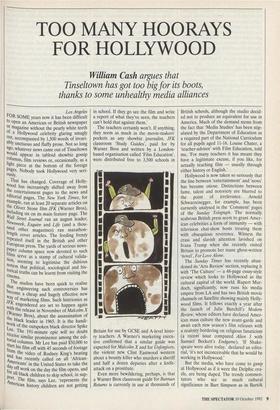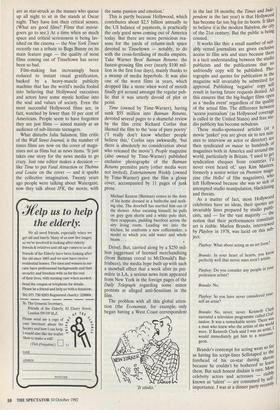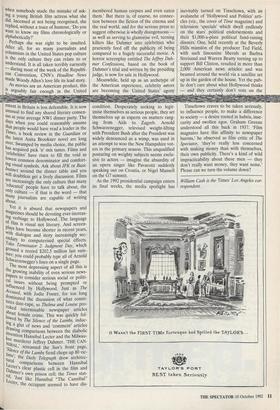TOO MANY HOORAYS FOR HOLLYWOOD
William Cash argues that
Tinseltown has got too big for its boots, thanks to some unhealthy media alliances
Los Angeles FOR SOME years now it has been difficult to open an American or British newspaper or magazine without the pearly white teeth of a Hollywood celebrity glaring smugly out, accompanied by 1,500 words of invari- ably unctuous and fluffy prose. Not so long ago, whatever news came out of Tinseltown would appear in tabloid showbiz gossip columns, film reviews or, occasionally, as a light piece at the bottom of the foreign Pages. Nobody took Hollywood very seri- ously.
That has changed. Coverage of Holly- wood has increasingly shifted away from the entertainment pages to the news and editorial pages. The New York Times, for example, ran at least 20 separate articles on the Oliver Stone film JFK (Warner Bros), Including six on its main feature page. The Wall Street Journal ran an august leader; Newsweek, Esquire and Life (and a thou- sand other magazines) ran marathon- length cover articles. The feeding frenzy repeated itself in the British and other European press. The yards of serious news- Paper column space now devoted to such films serve as a stamp of cultural valida- tion, seeming to legitimise the dubious notion that political, sociological and his- torical truths can be learnt from visiting the cinema.
The studios have been quick to realise Plat engineering such controversies has becomea cheap and hugely effective new way of marketing films. Such histrionics as drIC engendered are set to happen again With the release in November of Malcolm X (Warner Bros), about the assassination of the black leader in 1965. It is the handi- work of the outspoken black director Spike Lee. The 191-minute epic will no doubt receive similar prominence among the edi- torial columns. Mr Lee has paid $50,000 to start his film off with 45 seconds of footage from the video of Rodney King's beating and has recently called on all `African- Americans' in the United States to take the day off work on the day the film opens, and for all black children to skip school, in sup- PA __QM The film, says Lee, 'represents the American history children are not getting
in school. If they go see the film and write a report of what they've seen, the teachers can't hold that against them.'
The teachers certainly won't. If anything, they seem as much in the movie-makers' pockets as any showbiz journalist. JFK classroom 'Study Guides', paid for by Warner Bros and written by a London- based organisation called 'Film Education', were distributed free to 3,500 schools in Britain for use by GCSE and A-level histo- ry teachers. A Warner's marketing execu- tive confirmed that a similar guide was expected for Malcolm X and for Unforgiven, the violent new Clint Eastwood western about a bounty killer who murders a sheriff and half a dozen deputies after a knife- attack on a prostitute.
Even more bewildering, perhaps, is that a Warner Bros classroom guide for Batman Returns is currently in use at thousands of
British schools, although the studio decid- ed not to produce an equivalent for use in America. Much of the demand stems from the fact that 'Media Studies' has been stip- ulated by the Department of Education as a required part of the National Curriculum for all pupils aged 11-16. Louise Chater, a `teacher-advisor' with Film Education, told me, 'For many teachers it has meant they have a legitimate excuse, if you like, for actually teaching film — usually through either history or English.'
Hollywood is now taken so seriously that the line between 'entertainment' and 'news' has become otiose. Distinctions between fame, talent and notoriety are blurred to the point of irrelevance. Arnold Schwarzenegger, for example, has been earnestly analysed in the 'Comment' pages of the Sunday Telegraph. The normally scabrous British press seem to grant Amer- ican celebrities a form of immunity — with television chat-show hosts treating them with obsequious reverence. Witness the crass and slavish attention lavished on Ivana Trump when she recently visited Britain to promote her inane ghost-written `novel', For Love Alone.
The Sunday Times has recently aban- doned its 'Arts Review' section, replacing it with 'The Culture' — a 48-page essay-style review which looks to Hollywood as the cultural capital of the world. Rupert Mur- doch, significantly, now runs his media empire from LA and has two British movie channels on Satellite showing mainly Holly- wood films. It follows exactly a year after the launch of Julie Burchill's Modern Review, whose editors have declared Amer- ican mass culture the new avant-garde and await each new season's film releases with a zealotry bordering on religious fanaticism (a recent issue compared Alien 3 with Samuel Beckett's Endgame). 'If Shake- speare were alive today,' declared an edito- rial, 'it's not inconceivable that he would be working in Hollywood.'
But the media, who have come to gawp at Hollywood as if it were the Delphic ora- cle, are being duped. The trendy commen- tators who see as much cultural significance in Bart Simpson as in Bart& are as star-struck as the masses who queue up all night to sit in the stands at Oscar night. They have lost their critical senses. (What are good films? Films that movie- goers go to see.) At a time when so much space and critical seriousness is being lav- ished on the cinema — the New York Times recently ran a tribute to Bugs Bunny on its main feature page — the quality of most films coming out of Tinseltown has never been so bad.
Film-making has increasingly been reduced to instant visual gratification, backed by a heavy-muscle publicity machine that has the world's media fooled into believing that Hollywood executives and actors have some mystic hotline into the soul and values of society. Even the most successful Hollywood films are, in fact, watched by fewer than 10 per cent of Americans. People seem to have forgotten they are just films — aimed mainly at an audience of sub-literate teenagers.
What disturbs Julia Salamon, film critic of the Wall Street Journal, is the number of times films are now on the cover of maga- zines not as films but as news items. 'It just takes one story for the news media to go crazy. Just one editor makes a decision like Time to put Fatal Attraction or Thelma and Louise on the cover — and it sparks the collective imagination. Twenty years ago people were talking about Watergate, now they talk about JFK, the movie, with the same passion and emotion.'
This is partly because Hollywood, which contributes about $2.5 billion annually to the US balance of payments, is practically the only good news coming out of America today. But there are more pernicious rea- sons for the yards of column-inch space devoted to Tinseltown — notably, to do with the cross-fertilising of media empires. Take Warner Bros' Batman Returns: the fastest-grossing film ever (nearly $100 mil- lion in the first four days), mainly thanks to a swamp of media hyperbole. It was also one of the worst films in years, which dropped like a stone when word of mouth finally got around amongst the regular pub- lic that it was utterly devoid of plot or point.
Time (owned by Time-Warner), having sunk $55 million into Batman Returns, devoted several pages to a shameful review by the film critic Richard Corliss that likened the film to the 'soar of pure poetry' (`I really don't know whether people believe this,' Corliss says awkwardly, 'but there is absolutely no consideration about who released the movie'). People magazine (also owned by Time-Warner) published exclusive photographs of the Batman Returns premiere party (other media were not invited). Entertainment Weekly (owned by Time-Warner) gave the film a glossy cover, accompanied by 11 pages of junk prose.
Michael Keaton (Batman) comes to the door of his home dressed in a bathrobe and noth- ing else. The doorbell has startled him out of the shower. After excusing himself, he pulls on grey gym shorts and a white polo shirt, then reappears, padding barefoot across the airy living room. Leading me into the kitchen, he confronts a new coffeemaker, a model to which you add water and whole beans . . . •
Drivel. But, carried along by a $250 mil- lion juggernaut of licensed merchandising (from Batman cereal to McDonald's Bat- frisbees), the media hype built up with such a snowball effect that a week after its pre- miere in LA, a serious news item appeared from New York in the foreign pages of the Daily Telegraph regarding some minor protests at alleged anti-Semitism in the film.
The problem with all this global atten- tion (the Economist, for example, only began having a West Coast correspondent `It stinks.' in the last 18 months; the Times and Inde- pendent in the last year) is that Hollywood has become far too big for its boots. It likes to believe it is the modern Babylon, the city of the 21st century. But the public is being conned. It works like this: a small number of suit- ably vetted journalists are given exclusive access to film sets and stars because there is a tacit understanding between the studio publicists and the publications that no unfriendly copy will be published. pho- tographs and quotes for publication in the magazine will invariably be submitted for approval. Publishing 'negative' copy will result in having future requests denied. All this ensures that the big-budget films open as a 'media event' regardless of the quality of the actual film. The difference between `access journalism' (as Hollywood coverage is called in the United States) and free stu- dio publicity has become nebulous. These studio-sponsored articles (ata movie 'junket' you are given six to ten min- utes to interview an actor or director) are then syndicated en masse to hundreds of magazines both in America and around the world, particularly in Britain. 'I used to get syndication cheques from countries I never even heard of,' says Kim Masters, formerly a senior writer on Premiere maga" zine (the Hello! of film magazines), who left Hollywood because she was so sick of attempted studio manipulation, blacklisting and threats. As a matter of fact, most Hollywood celebrities have no ideas, their quotes are invariably lines prepared by studio publi- cists, and — for the vast majority — the notion that their performances constitute art is risible. Marlon Brando, interviewed by Playboy in 1978, was lucid on this sub- ject.
Playboy: What about acting as an art form?
Brando: In your heart of hearts, you know perfectly well that movie stars aren't artists.
Playboy: Do you consider any people in your profession artists?
Brando: No.
Playboy: So you have never considered your- self an artist?
Brando: No, never, never. Kenneth Clark narrated a television programme called Civil- isation. It was a remarkable series. There A'55. a man who knew who the artists of the world were. If Kenneth Clark said I was an artist, I would immediately get him to a neurosur- geon.
Brando's contempt for acting went so far as having his script-lines Sellotaped to the forehead of his co-star during shoots because he couldn't be bothered to learn them. But such honest disdain is rare. Most celebrity actors and actresses — risibly known as 'talent' — are consumed by self- importance. I was at a dinner party recently when somebody made the mistake of ask- ing a young British film actress what she did. Incensed at not being recognised, she replied, without a trace of humour, 'Do you want to know my films chronologically or alphabetically?' Perhaps she was right to be insulted. After all, for so many journalists and columnists in the United States pop culture is the only culture they can relate to or understand. It is all taken terribly earnestly — during most of the week of the Republi- can Convention, CNN's Headline News made Woody Allen's love life its lead story. As movies are an American product, this is arguably fair enough in the United extent in Britain is less defensible. It is now unusual to find any shared literary consen- sus at your average NW1 dinner party. The days when you could reasonably assume that people would have read a leader in the Times, a book review in the Guardian or the latest Anita Brookner novel are long over. Swamped by media choice, the public has acquired pick 'n' mix tastes. Films and celebrities' have risen to fill the void as lowest common denominator and comfort- ing visual symbols. Ask about JFK or Basic Instinct around the dinner table and you will doubtless get a lively discussion. Films are increasingly the only culture that many `educated' people have to talk about, the Only culture — if that is the word — that Many about. journalists are capable of writing Yet it is absurd that newspapers and magazines should be devoting ever-increas- ing verbiage to Hollywood. The language of film is visual not literary. And screen- Plays have become shorter in recent years, with dialogue and story increasingly sec- ondary to computerised special effects. Take Terminator 2: Judgment Day, which grossed a record $202.5 million last sum- m_ er: you could probably type all of Arnold Schwarzenegger's lines on a single page. The most depressing aspect of all this is the growing inability of even serious news- papers to consider serious social or politi- cal issues without being prompted or influenced by Hollywood. Just as The Accused, with Jodie Foster, for too long dominated the discussion of what consti- tutes date-rape, so Thelma and Louise pro- voked interminable newspaper articles about female crime. This was quickly fol- lowed by The Silence of the Lambs, induc- in. g glut of news and 'comment' articles 9rawing comparisons between the diabolic ,invention Hannibal Lecter and the Milwau- Ze murderer Jeffrey Dahmer. 'THE CAN- c,1.13A-1-,' screamed the Sun's front page, ...3.1lence of the LaMbs fiend chops up 80 vic- !nos% the Daily Telegraph drew architec- tural comparisons between Hannibal Dahmer's clear plastic cell in the film and uhmer's own prison cell; the Times stat- ed, 'Just like Hannibal "The Cannibal" Lecter, the occupant seemed to have dis- membered human corpses and even eaten them.' But there is, of course, no connec- tion between the fiction of the cinema and the real world, and for the serious press to suggest otherwise is wholly disingenuous as well as serving to.glamorise evil, turning killers like Dahmer into celebrities who pruriently feed off the publicity of being compared to a hugely successful movie. A horror screenplay entitled The Jeffrey Dah- mer Confessions, based on the book of Dahmer's trial and written by the presiding judge, is now for sale in Hollywood.
Meanwhile, held up as an archetype of the American experience, celebrity actors are becoming the United States' agony condition. Desperately seeking to legit- imise themselves as serious people, they set themselves up as experts on matters rang- ing from Aids to Zagreb. Arnold Schwarzenegger, televised weight-lifting with President Bush after the President was widely denounced as a wimp, was used in an attempt to woo the New Hampshire vot- ers in the primary season. This unqualified posturing on weighty subjects seems exclu- sive to actors — imagine the absurdity of an opera singer like Pavarotti suddenly speaking out on Croatia, or Nigel Mansell on the G7 summit.
As the 1992 presidential campaign enters its final weeks, the media spotlight has inevitably turned on Tinseltown, with an avalanche of `Hollywood and Politics' arti- cles (viz., the cover of Time magazine) and television 'specials' which dwell endlessly on the stars' political endorsements and their $1,000-a-plate political fund-raising dinners. One, held recently at the Beverly Hills mansion of the producer Ted Field, with such limousine liberals as Barbra Streisand and Warren Beatty turning up to support Bill Clinton, resulted in more than 2,000 American news articles and was beamed around the world via a satellite set up in the garden of the house. Yet the pub- lic don't care about what Hollywood thinks — and they certainly don't vote on the
I L • •
Tinseltown craves to be taken seriously, to influence people, to make a difference to society — a desire rooted in hubris, inse- curity and swollen egos. Graham Greene understood all this back in 1937. 'Film magnates have this affinity to newspaper barons,' he observed as film critic of The Spectator, 'they're really less concerned with making money than with themselves, their own publicity. There's a kind of wild impracticability about these men — they don't really want money, they want noise.' Please can we turn the volume down?
William Cash is the Times' Los Angeles cor- respondent.




























































 Previous page
Previous page